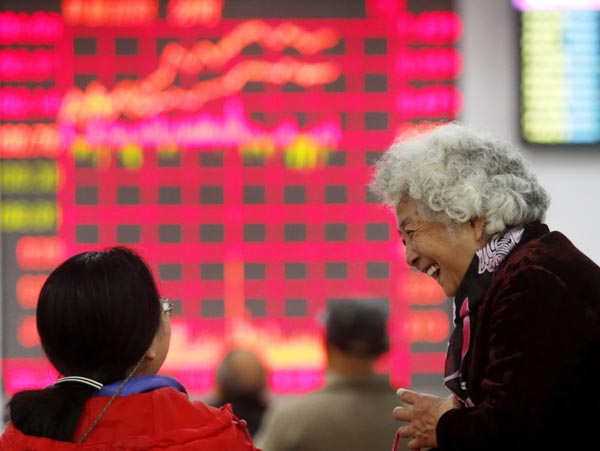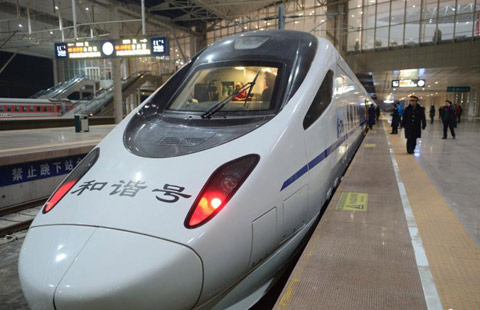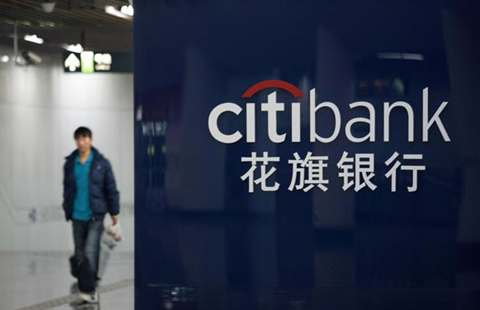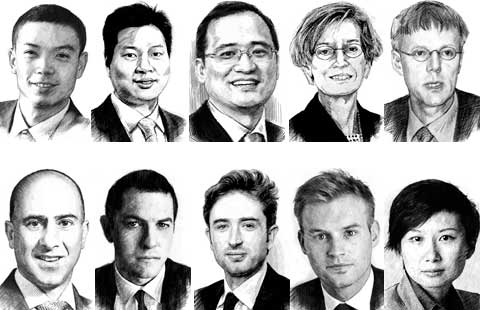Analysts see more gains for stocks this year
By Jiang Xueqing (China Daily) Updated: 2015-01-10 09:44
 |
|
An investor views a computer screen showing stock information at a brokerage in Shanghai on January 5, when stocks in China surged to their highest close in five years, led by property and energy shares. [Photo/Xinhua] |
The benchmark Shanghai Composite Index and the Shenzhen Component Index will continue to rise in 2015 as the central bank will keep reducing financial risks that were overestimated by the market, an investment strategist said on Friday.
"While we expect economic growth to slow marginally in 2015, we believe that the reforms implemented by the government so far have materially reduced the risks of a hard landing due to a disruptive default in either local government investment vehicles or wealth management product areas. This warrants a reduced risk premium on Chinese equities," said Zheng Yudong, head of investment strategy and advisory at Standard Chartered Bank (China) Ltd.
Chinese equities have been cheap for some time. However, Zheng said in an annual investment outlook report that valuations may increase in 2015 for three reasons:
.The Shanghai-Hong Kong Stock Connect program is likely to encourage flows into the onshore market.
.Investors are increasing allocations to Chinese stocks in general.
.The tail risks to this outlook are diminishing, which warrants a reduced valuation discount.
Tail risk is the risk of an asset moving by a larger-than-expected amount.
As a result, Standard Chartered has raised its stance to Chinese equities to overweight, both in the regional and local contexts.
He forecast that the People's Bank of China, the central bank, will lower interest rates or banks' reserve requirement ratios once in the first half of this year. Such moves will benefit the financial and real estate sectors of the A-share market.
Share prices of large State-owned enterprises in resources-related sectors such as cement and construction materials also have the potential to rise in response to opportunities for development connected with the Silk Road Economic Belt and the 21st Century Maritime Silk Road initiatives, he said.
Investment strategists at Standard Chartered expect 2015 to be the third successive year for global equities to outperform bonds. Forecast rate increases by the United States Federal Reserve Board are likely to weigh on bonds, they said.
Meanwhile, market trends from the past three Fed rate hike cycles show global equity returns have averaged 6 percent in the six months prior to the first Fed rate hike and 8 percent in the six months thereafter. Returns from bonds have been lower over the same period.
The start of the US interest rate-hike cycle risks an increase in short-term volatility and investors should be prepared for this. They will benefit if they widen their investment horizons to include less traditional sources of return, Zheng said.
Stocks on the Chinese mainland ended lower on Friday after hitting five-year highs, in one of their most volatile trading sessions since the global financial crisis.
Key indexes briefly surged more than 3 percent in afternoon trade, partly lifted by speculation of further monetary easing, but they quickly pulled back to end the day slightly lower.
The CSI300 Index of the largest listed companies in the Shanghai and Shenzhen bourses fell 0.4 percent to 3,546.72 points, while the Shanghai Composite Index lost 0.2 percent to 3,285.41 points.
- Vehicle sales climb at slower pace, hit by cities' restrictions
- Big data analysis helps improve regulators' work
- Analysts see more gains for stocks this year
- Retail fuel prices set for new cuts
- Apple may find its new core in China
- Tax revenues curbed by economic slowdown
- Alibaba chief apologizes for JD tirade
- Risking life for power

















